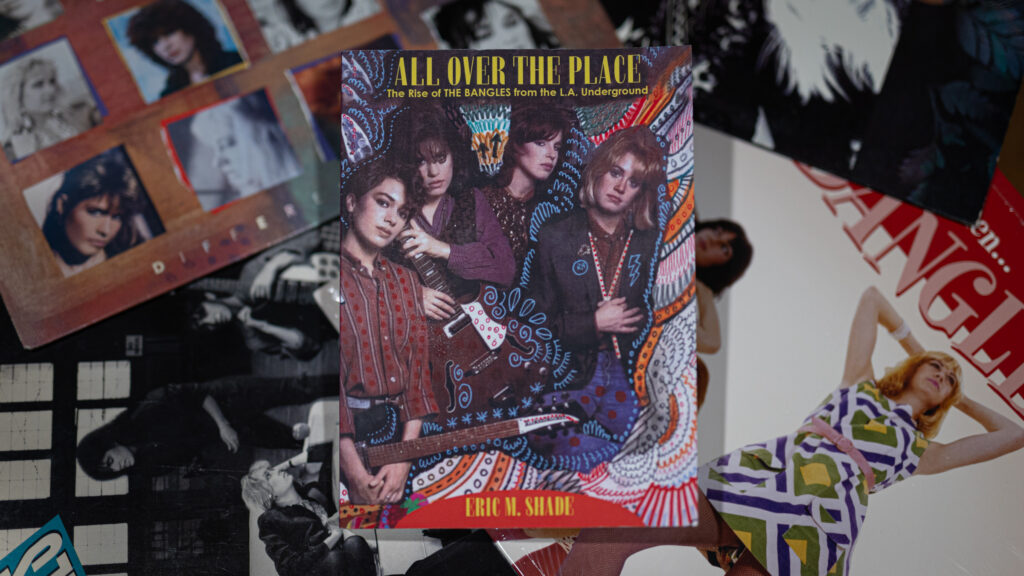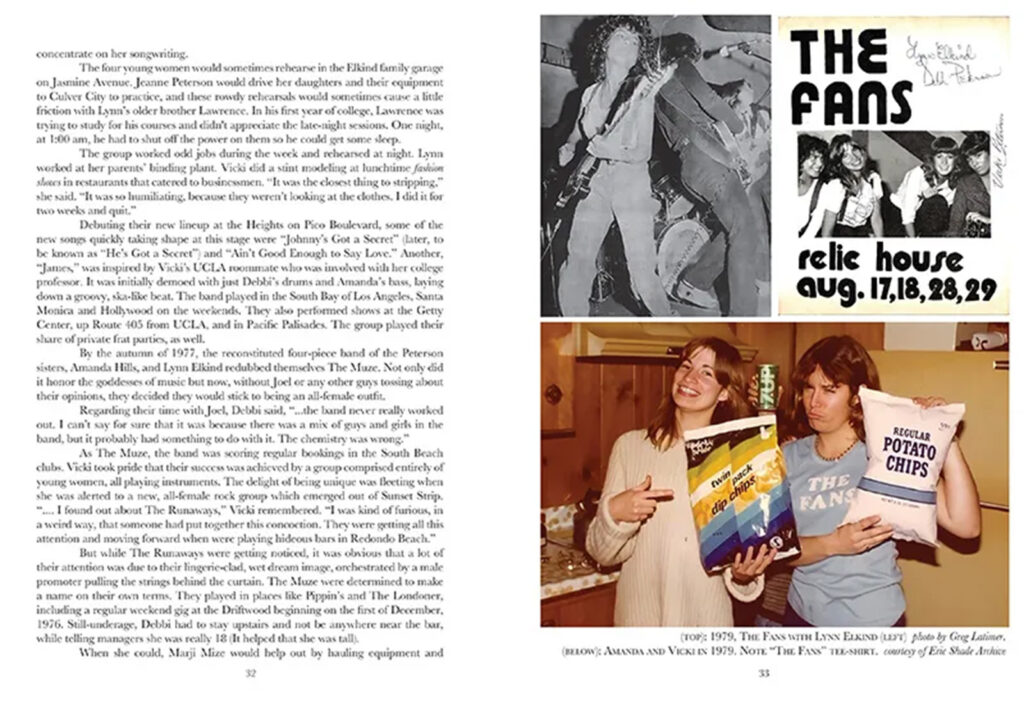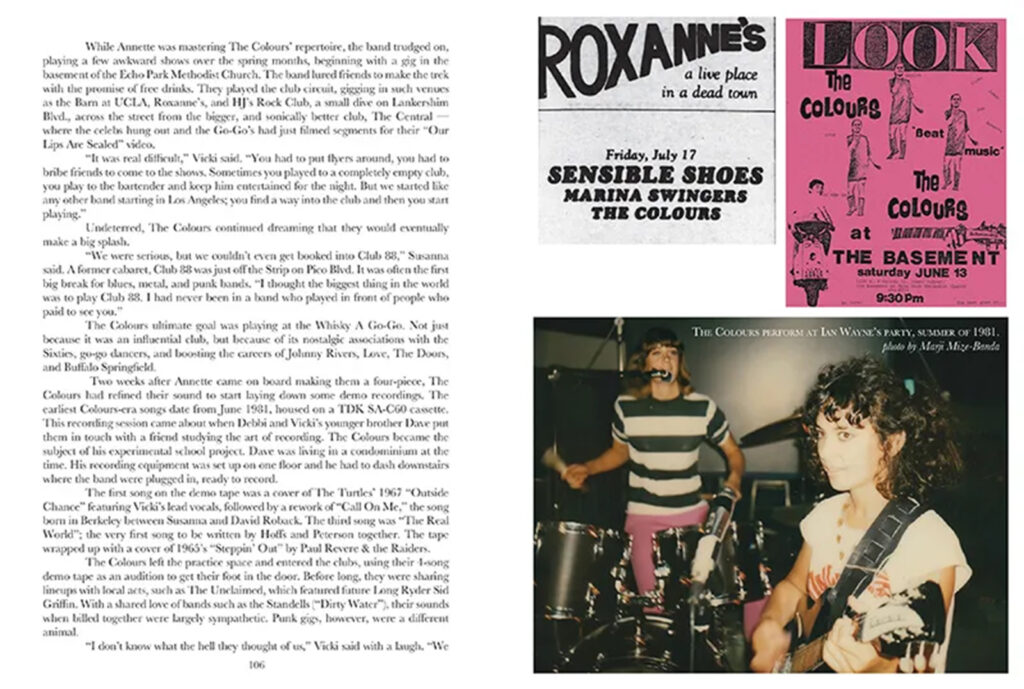
“…the early ’80s in Los Angeles was a special time,” explains author Eric M. Shade in his introduction to his book.
Having formed in 1981 and topping the charts on multiple continents before disbanding in 1989, followed by reuniting for two additional albums, it’s strange that there hasn’t been a book dedicated to the Los Angeles band The Bangles prior to this. Although diving into the intricacies, the recordings, and the interpersonal politics of a group may prove too exhaustive to contain in the pages of a single book. Shade did his best, which is the book’s attraction and its liability.
Best known for songs the songs “Manic Monday,” “Walk Like An Egyptian” and “Eternal Flame”, The Bangles unquestionably have a spot on the soundtrack of the 80s. However it is the 80s-ness of their music that the four members were never searching for, and then found themselves fighting to escape. The musicians who first bonded and started the playing together based on their mutual interest of LA’s early underground punk music and a shared affection for 60s folk pop ultimately were anchored by a music industry who steered them onto a course of plowing ahead with 80s pop hits taken from other songwriters.
ALL OVER THE PLACE – The Rise and Fall of The Bangles from the LA Underground starts at the beginning and makes an attempt to cover all of that ground. In fact, starting by devoting chapters to the background of each member (5 total counting Annette Zilinskas who was replaced on bass by Michael Steele. Steele played on the albums that would become the band’s best known releases), readers will find themselves 180 pages deep before Steele joins the band.

The book makes mention of Vicki and Debbi Peterson’s earlier bands and incarnations, one notably being The Hollywood Girls which overlapped with the 80’s LA punk scene and was captured by the lens of photographer Theresa Kereakes. The book also describes Susanna Hoffs’ early relationship and recordings with David Roback, who would later be part of the Paisley Underground scene in his band Rain Parade and eventually would be the songwriter behind Mazzy Star. The Bangles, as they were ultimately named, themselves first met through a flier placed inside the women’s restroom at LA’s Whisky a Go Go club by Hoffs.
The book recounts playing to empty clubs in the years with Annette on bass. The band at this point was known as The Colours. At another point in the book, Shade also describes the origins of the name, The Paisley Underground, the scene that The Bangles fostered and emerged from. Shade recalls Gary Jacobelly of the band, Peer Group, having a hatred of the pattern, and ad libbing a lyric mid-song during a performance at which one of his bandmate’s wore a paisley dress. The term would stick.
The book is filled with stories like these – where Shade essentially draws a timeline of The Bangles career and explores tangents and connections of all of the players along the way. Often, the book will delve into the backgrounds of each of the new mentions to help add context.
Those who are interested in the interconnectedness of the musicians, managers, record labels, producers and outside output by those in the the band’s orbit will appreciate the depth and no-stone-unturned approach that Shade took writing the book. Shade goes into great length detailing the behind the scenes of recording the albums, including things like cut tracks (many have since been released on YouTube or B-Sides and compilation records, making for learning of lots of ‘new’ old material that I had never heard previously!) and why some songs ultimately made the album while others didn’t.
The book follows the gradual unraveling that came from the explosion of the group’s Different Light album and the lengthening demands and tour cycles that the record label pressured the women to maintain the hype of record sales. And while the start and initial end of the band fill the majority of the 430+ pages, there are details the group’s post-reunion Doll Revolution and Sweetheart of the Sun albums as well, along with some of the solo and collaborative recordings made by members outside of The Bangles.

With 30 years as a band, the book opted to remain lean on emotion and instead stuck to introducing each album or tour, and then linearly following in detail through the timeline. At times, it felt as if there was just an unreal amount of dates, names, and events crammed into a single page, and while the desire for completeness makes sense for a book taking on the band’s career, it’s at the detriment of really diving into certain events. Though I suppose any reader familiar with the band will have their own wishes for who or what would be given more page space. And Shade does a great job of covering details such as Hoffs’ infamous eye contact in the “Walk Like An Egyptian” video to the alienation each member felt that their biggest songs were written by others (Prince having penned “Manic Monday” being one example) and how it was youthful insecurity combined with indifferent management teams that dropped the ball on pushing singles written by the band.
By the end of the book, one recurring theme throughout The Bangles, as well as the members’ outside projects, was the label politics which played out like a bad dream, where you’re constantly stuck and unable to make any forward motion until eventually you give up. Those only familiar with the band’s classic albums and singles might find it easy for this to be their legacy. Though Shade sheds light on all of the other projects, especially the later ones where the group was able to take control and create the recordings that they had wanted to create.
In all, ALL OVER THE PLACE tells the story of a band who musically were at the top of the pop music machine, but never quite hit their stride because of that label pressure, and ended up overshadowed by others with more media-friendly sensationalized drama. Though this book helps correct that, offering for the first time a lengthy read on a band with some of the most iconic songs of the 80s era, as well as catalogs of debatably better, if less pop radio friendly, songwriting outside of that era.
Published by HoZac Books, 2024

